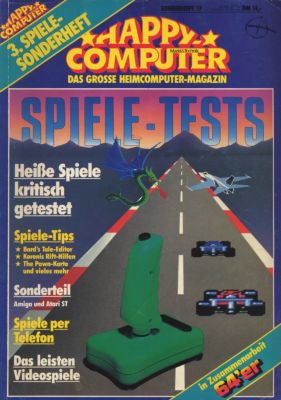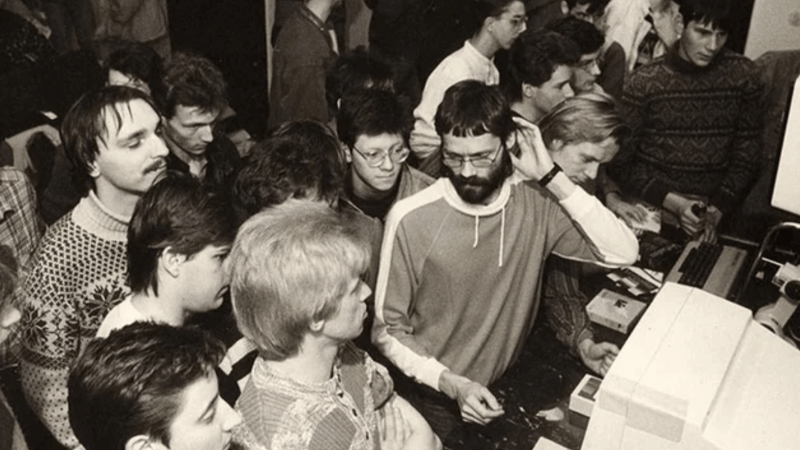During the late 1980s, a gaming scene emerged in East Germany just before the fall of communism. Teenagers gathered in buildings like the “House of Young Talents” (HdjT), originally Palais Podewils, to watch and play Commodore 64 games. There were 20 similar clubs in Berlin alone, sometimes with more than 70 people crowded into a single room. Above all, the computers they were in possession of were all made in the West.
At a point in time when loyalties were frequently questioned, the club of self-proclaimed “freaks” soon attracted the attention of the Stasi, GDR (East Germany) intelligence agents who kept close tabs on the group. As one Stasi agent warned:
Given that there are also members within the interest groups or computer clubs with a verifiably negative attitude toward the socialist state and social order, there is a potential danger that the interest groups or computer clubs will go in a negative direction.
 Domestically produced computers – the KC 85 from VEB Mikroelektronik Wilhelm Pieck Mühlhausen and the KC 87 from VEB Robotron – did not have the quality of C128 and C64s from Commodore. Surprisingly, even while microelectronics remained on the list of embargoed products imported to East Germany, C64s managed to make their way into the state. The GDR customs officials didn’t have any problem with Western imported hardware – what they were worried about was the software.
Domestically produced computers – the KC 85 from VEB Mikroelektronik Wilhelm Pieck Mühlhausen and the KC 87 from VEB Robotron – did not have the quality of C128 and C64s from Commodore. Surprisingly, even while microelectronics remained on the list of embargoed products imported to East Germany, C64s managed to make their way into the state. The GDR customs officials didn’t have any problem with Western imported hardware – what they were worried about was the software.
By the end of the 80s, modern data traffic over telephone lines had arrived in East Germany, causing fear that software would soon be disseminated without the need of a physical medium. For the gamers of GDR, however, many didn’t even have access to a phone line. They just wanted to go to computer clubs to swap software. Since computer games from the West were only available in government-run Intershop stores and not in normal shops, teenagers had to rely on the computer clubs to access these games. Games like Frogger and Rambo would be copied to cheaper cassette tapes – it wouldn’t even be violating the saw law since software was not protected by copyright within the country.
A few politically charged games – “Raid Over Moscow” and “Kremlin” – were forbidden to ensure that the HdjT wouldn’t be shut down. Towards the end of the GDR, the Stasi desperately tried to gain control of games “relating to the increasing activities of the political opponent”, but by this point the political situation was already heading towards the fall of the Wall. [Stefan Paubel], founder of the HdjT reflected that he was disappointed the Stasi didn’t try harder to report on the computer clubs.
They had everything critical in the reports: Swapping software, a complete list of all the games glorifying war and computers from the West.
It appeared that microelectronics were sacred to the GDR, since officials were trying to get more young people to engage with computers. The regime’s concern for their reputation led them to prioritize other forms of surveillance than technology. For a while after the fall of the Berlin Wall, the computer club continued to exist. It wasn’t until August 1990, two months before reunification, that the remaining members decided to dissolve the club.
[Thanks to Frank for the tip!]
















“it wouldn’t even be violating the saw”
Saw? ;)
Sorry, “… viosating the saw … “
“I saw nussink!”
– Sgt Schulz
Ah, Sgt Schultz, my German teacher from childhood. Limited vocabulary, and we never worked on spelling, but I’ll never forget what he did drill into my young impressionable mind.
Ya volt, commendant!
I’m assuming the author meant to spell the word ‘law’, but for awhile I got very confused looking up acronyms for SAW. I can guarantee you there are no known acronyms that fit–unless SAW stands for Software Architecture Workshop.
Either an auto correction fail or the author used the ring finger of the wrong hand (left instead of right) when typing :-)
Seems typical. Once it was no longer verboten the participants all quit.
What we’re dealing with here is a total lack of respect for the saw.
That’s the way you develop cutting edge technology
Their law!!!!
They saw!
Until…. I fought the saw and the saw won.
Out of totalitarian state in 1989 … back to it in 2019. Thanks to 3-letter agencies and “media” monopolists.
BS.
I was born in Berlin. There is no way one can seriously compare the DDR (it’s “DDR”, not “GDR”, Americanos – we don’t say “Neu York”, we say “New York”, so you can learn to say “DDR”!) to today’s situation.
Backward headed brickbrains may want “the old days” back – but as someone who grew up with the wall I can tell you that those people are either too old to remember how to breathe or too young to know what real shit feels like.
Nobody wants the wall back … but new ones are already around us. Big brother collects everything, even more so than in DDR.
You want to run for a public office? They will scan your activity and see whether you are “good”. Or else, compromising data will be “leaked” to the media …
Well… I thinking that I do not need to say much… In Spain since 1. febr to 22. febr.
OK, OK, from now on I’ll call the German Democratic Republic the DDR, https://en.wikipedia.org/wiki/Dance_Dance_Revolution
Long live the Dance Dance Revolution, “Tänzer aller Länder, vereinigt euch!”
When we did the C128 the lawyers in charge of export would often use my databook library and I walked them through all of the suspected issues; clock frequency, MIPS, encryption, etc. As it was the C128 (and C64) passed our (US) requirements for export as far as we knew and we submitted it as such. We also had a major office in West Germany that followed up and my memory is that they did not see any issues either. We even had some parts made in the USSR on the approved vendor list initially. (I had them removed due to them not meeting the Pd spec)
The situation of computers and electronics was particularly interesting in GDR. Because of embargo, this state produced many computer clones : PC compatibles, VAX-11 clones (with custom Unix)… They even produced their own CPUs, for example a clone of Z80 (U880), and they had their own compatible versions of popular operating systems like CP/M (SCP) or DOS (DCP). A rare version of Windows 3.0 (Karl-Marx-Städter Window-System), for Robotron compatible PC, existed but seems to be lost.
If you need more detailed information about the gaming scene behind the Iron Curtain, buy book Gaming the Iron Curtain from MIT Press, author Jaroslav Svelch. In Czechoslovakia the hobby gamers swapped games without any supervision from the communist regime. Maybe because the ruling communist party was ruled by the gerontocracy aparatchicks. Subversive games against regime also circulated as well as antisoviet games like Raid over Moscow without any effort from the government to make surveillance.
I hear you… No one understands what a police state does to you and the people around you, unless you’ve lived through it. Does your neighbors file complaints against you? Your coworkers? Your family members? You never really knew, but you could be damn sure at least one of them would. For personal gain or to get themselves off the hook or just because they would be perceived as a good well-formed cog in the wheel — doesn’t really matter in the end…
Paradoxically, what came in the years afterwards wasn’t too pretty for us either — factories foreclosed, skyrocketing unemployment and the deep mistrust among us that never really vanished. This sense of distrust carries on even to the next generations it seems. But comparing 1989 to 2019 is bollocks — at least for us in Germany.
That being said — we should be alerted by the developments of the recent decade. Authoritarian rule is having a comeback in the West. The walls of today are being use to keep people out, not in and the operational modes have changed. But some police forces are starting to use text-book “Zersetzungsstrategien” paired with systemic cover-ups and a seemingly all-encompassing surveillance regime. For now they are limited to immigration- and environmental activists — but it won’t end there if we are not careful.
Grüße aus Leipzig.
In some countries in Eastern Europe, standard of living fell bellow what they had in the 1980’s. Some still have not fully recovered.
“did not have the quality of C128 and C64s from Commodore”. Wow, Commodore wasn’t exactly known for that in the U.S. As Bil once said, they just had to last long enough to get under your Christmas tree :)